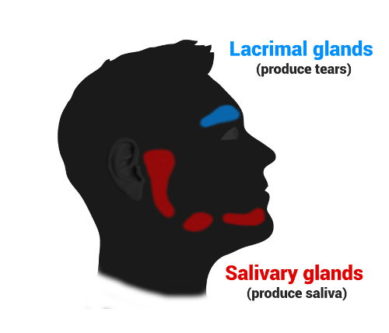Sjögren’s Syndrome
What is Sjögren’s Syndrome (SS)?
Sjögren’s Syndrome is a condition that mainly causes dry eyes and dry mouth. It is an autoimmune disease that affects the glands in the body called exocrine glands. These are glands that produce substances such as saliva, tears, sweat and digestive juices.
There are 2 classifications of Sjögren’s syndrome; Primary Sjögren’s syndrome occurs on its own whilst secondary Sjögren’s syndrome occurs along with another rheumatic disease such as rheumatoid arthritis or systemic lupus erythematosus.

Causes of Sjögren’s Syndrome
Sjögren’s syndrome most commonly affects people between aged between 40-60 years. It is estimated that half a million people in the UK have Sjögren’s syndrome with females around 9 times more likely than men.
The body’s immune system protects against infection and injury. In autoimmune conditions, the immune system become over active and produces antibodies that target normal healthy tissue, resulting in damage. In Sjögren’s syndrome, inflammation is targeted at the glands.
The exact cause of Sjögren’s syndrome is unknown, but there is evidence of genetic and environmental factors. Although there is no common inheritance of Sjögren’s syndrome in families, other autoimmune conditions associated with secondary Sjögren’s syndrome can be seen more commonly.
Symptoms of Sjögren’s Syndrome
Most common symptoms:
- Dry, sore, gritty eyes
- Strong lights may feel uncomfortable, or the eyes become sticky with mucus
- Dry mouth and/or throat
- This can cause difficulty chewing or swallowing food- or lead to mouth ulcers or altered taste.
- Occasionally, a very dry mouth can lead to other problems such as fungal infections.
- The salivary glands may also become painful and/or swollen.
- Fatigue
- Un-refreshed following sleep. Some people may also feel down or depressed.
There may also be dryness of the skin, vagina or breathing tubes.
Rarely Sjögren’s syndrome can be associated with developing other conditions such as:
- Joint pain or stiffness
- Some joints may also be swollen. Joint problems are usually less severe than in RA
- Skin changes
- Raynaud’s phenomenon- finger or toes turning pale, then blue in the cold (see separate page on Raynaud‘s).
- Nerve problems
- Reduced sensation in the nerves of the hands and feet
- Underactive thyroid
- Lung problems
- Kidney and liver problems
- Problems with your blood
- Anaemia
- Lymphoma- cancer of the white blood cells. This can cause enlarged lymph glands in your neck, armpit and groins as well as fevers and night sweats.
How do we diagnose Sjögren’s Syndrome?
A history of relevant symptoms will be the most important way that the doctor suspects the diagnosis. This will be confirmed by relevant tests that includes:
- Schirmer’s test
- Tests for tear production-a sterile strip of paper is placed under the lower eyelid for 5 minutes
- Formal eye examinations for tear production can be carried out at your opticians
- Saliva production
- you will be asked to spit into a pot for 5 minutes and the volume of saliva will be measured.
- An ultrasound of the salivary glands may show if there are areas of damage or immune cell accumulation within the tissues
- Blood tests
- Full blood counts, kidney and liver functions
- Thyroid function tests
- Inflammation markers- ESR and CRP
- Autoimmune screens including ANA and ENA for anti-Ro, anti-La
- Immunoglobulins and complement screens
- Minor salivary gland biopsy. This test is reserved for cases that are not diagnosed based on the above tests, but where the doctor still suspects the diagnosis of Sjögren’s Syndrome.
Treatment
No treatment is available as a cure for Sjögren’s syndrome. Treatments are available to improve the troublesome symptoms. Some medication have side effects that can worsen symptoms
- Eye symptoms
- Lubricating eye drops/ creams or sprays
- In severe cases, eye specialists can carry out procedures to open up tear ducts
- Mouth symptoms
- Mouth rinses and good oral hygiene
- Artificial saliva
- Use of lozenges and sugar free gum can help
- Anti-fungal treatments can be prescribed for infections
- Other treatments
- Humidified environments
- Graded exercise for fatigue
- Drug treatments
- Pilocarpine- increases gland production of fluids
- Short steroid treatment for gland inflammation
- Painkillers including NSAIDs
- DMARD’s for arthritis and other systemic complications
- Hydroxychloroquine can be used when the symptoms are severe and in cases of secondary Sjögren’s syndrome.
Useful Links
Versus Arthritis: http://www.versusarthritis.org
British Sjögren’s Syndrome Association: https://www.bssa.uk.net
